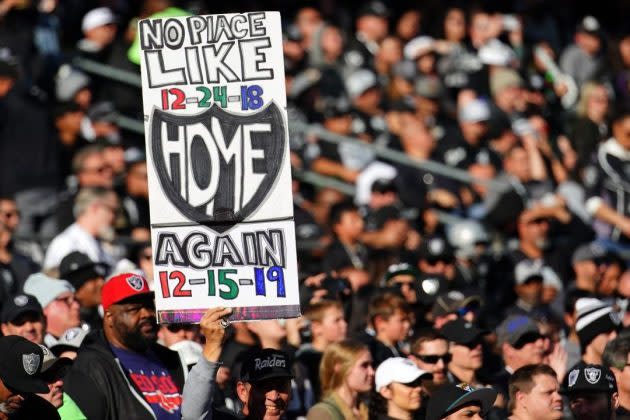NFL Could Land in Front of SCOTUS Again Thanks to Oakland Lawsuit

It’s been four years since the NFL was a party in a case before the U.S. Supreme Court, but that streak could end if the city of Oakland gets its wish. Oakland has petitioned the Court to review its antitrust challenge to the Raiders’ relocation to Las Vegas. If the Court grants certiorari, the lawfulness of pro teams skipping town would take center stage in a hearing before the nine justices.
After the Raiders left, the city of Oakland sued the NFL, arguing that a “rigged process” led to the franchise’s departure. The Raiders, the suit points out, paid a $378 million relocation fee to the 31 other teams, which the city portrays as a bribe. As Oakland sees it, the team’s move—blessed by the league and every other team except the Miami Dolphins—constituted an illegal group boycott of the city and price fixing.
More from Sportico.com
The U.S. Court of Appeals for the Ninth Circuit disagreed. In siding with the NFL, the appellate court reasoned that while other teams supported the Raiders’ move, they weren’t boycotting Oakland. Only the Raiders refused to conduct business dealings with the city. The Ninth Circuit also found that Oakland lacked standing to advance a price-fixing claim.
The claim is premised on the league and teams acting like a so-called “cartel,” in that they limit the number of franchises and then use that exclusivity to make it extremely expensive for cities to keep or attract teams. Whether or not that’s true, the Ninth Circuit reasoned, Oakland didn’t suffer a price-fixing injury since it didn’t pay. If any city has a Raiders-related price-fixing case, the court reasoned, it would be Las Vegas, which contributed $750 million to building Allegiant Stadium.
In its petition to the Supreme Court, Oakland contends that the Ninth Circuit relied on an “outdated doctrine about who can sue for antitrust violations.” As Oakland sees it, the Ninth Circuit’s surmising that Las Vegas, but not Oakland, would have standing doesn’t make sense. “Having won the contest for the team,” Oakland asks, why would Las Vegas “have any incentive to sue the NFL?” Oakland insists being “priced out of the market” by the “cartel” ought to be enough to wage a case. To boost that argument, Oakland charges that the Supreme Court has adopted a more permissive test for standing under another federal law, the Lanham Act.
The NFL’s brief urges the Court to deny Oakland’s petition, maintaining the city’s allegations are “speculative” and its “alleged injuries” are “so attenuated and speculative” that no court should hear them. As the league tells it, Oakland fails to argue that the Raiders or league did anything illegal.
To that end, the NFL’s brief details the “deterioration” of the Oakland Coliseum and how it “gained notoriety” for such problems as mice in soda machines and flooding sewage. The Raiders, the league says, spent years engaged in “unsuccessful negotiations for a new stadium in Oakland” until finally turning to other options, including Las Vegas. The NFL insists it conducted a review of the move and found it met necessary criteria. The league also maintains there’s nothing illegal about a private sports league assessing when it makes sense to add new teams. Further, the NFL points out, there’s an absence of a “circuit split” in this controversy. The Court is more likely to hear a case when different federal appeals courts reach conflicting decisions on the same question of law.
The Court’s docket indicates Oakland’s case will be distributed for conference in September. At least four of the nine justices must agree to review the case for it to be heard. The odds are decidedly against Oakland. Data indicates the Court only agrees to hear about 1% of petitions. But this Court hasn’t shied away from high-profile cases, including NCAA v. Alston, which, like Oakland v. Raiders, blended sports and antitrust. To the extent the justices believe that leagues, like the NCAA, are skirting responsibilities under antitrust law, the Court might be sufficiently interested.
If Oakland scores a review, expect other leagues to weigh in with amicus briefs on behalf of the NFL. They would have a stake in seeing their relocation and franchise admission policies protected from potential antitrust challenges (MLB is in a more favorable position on franchise relocation based on its antitrust exemption).
The last Supreme Court case involving the NFL was Murphy v. NCAA et al in 2018. In it, the Court held against the NCAA and the leagues, finding the federal ban on states legalizing sports betting was unconstitutional. Eight years earlier, the NFL lost American Needle v. NFL, in which the Court rejected the NFL’s argument that it and its teams are a single entity under antitrust law.
Best of Sportico.com